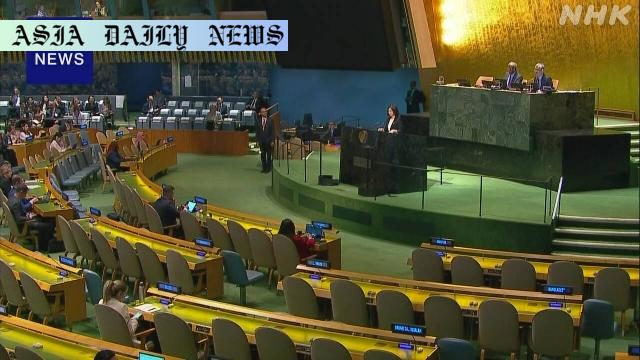North Korea: UN Assembly highlights dire human rights violations tied to nuclear programs.

North Korea’s Human Rights Violations: A Dire Crisis
The United Nations General Assembly recently turned its focus to the severe and worsening human rights situation in North Korea, highlighting issues that continue to plague the isolated state. During the plenary meeting held at the UN headquarters in New York, discussions revolved around the testimonies of defectors, controversies regarding international sanctions, and the connections between North Korea’s human rights abuses and its aggressive nuclear ambitions.
Voices of Defectors at the Center
A particularly harrowing moment unfolded as two female defectors from North Korea shared firsthand accounts of the grim realities within the country’s borders. These testimonies painted a stark picture of a nation rife with starvation, suppression, and systemic persecution. One woman spoke poignantly about the desperate situation faced by the citizens, even saying that risking one’s life crossing the Tumen River was preferable to staying and starving in North Korea. The other defector recounted the ruthless executions of young individuals for the mere act of watching South Korean dramas, a somber testament to the totalitarian grip of the regime.
Global Reactions and Accusations
Representatives from various nations, including the United States and Japan, emphasized the intertwined nature of North Korea’s human rights abuses and its unlawful nuclear endeavors. U.S. officials pointed out that the regime’s focus on nuclear and ballistic programs comes at the expense of its population, exacerbating poverty, hunger, and deprivation. Japan’s Ambassador Yamazaki Kazuyuki brought attention to North Korea’s abductions of foreign nationals and urged the international community to unite to secure their return.
A Divided Assembly
While the calls for action grew louder, dissenting voices surfaced. North Korea’s UN Ambassador Kim Song dismissed the defectors as fraudulent and accused them of abandoning their families. His remarks underscored the regime’s adamant denial of any wrongdoing. Meanwhile, Russia spotlighted its opposition to sanctions, arguing that such measures are detrimental to North Korea’s development and human rights protection. This stance reveals the growing strategic ties between Russia and North Korea, an alliance seen as countering increasing Western pressure.
Moving from Words to Action
The message from the defectors resounded clearly: silence is complicity. They implored UN members to take decisive actions against Pyongyang for its systemic oppression and criminal acts. The overarching narrative suggests that resolving North Korea’s internal strife is not merely a matter of aiding vulnerable citizens but a critical component of promoting global peace and security.
Commentary
The Stark Reality of North Korea’s Human Rights Situation
The testimonies presented at the UN meeting serve as a grim reminder of the atrocities faced by North Korean citizens. The stories of starvation, public executions, and suppression of even simple pleasures like watching a drama highlight how the regime exerts control through fear and deprivation. These accounts call for widespread attention, not only from policymakers but from the global public as well. The voices of defectors provide a rare glimpse into a nation shrouded in secrecy, and their courage must be met with meaningful support and action from the international community.
An Intersection of Human Rights and Security
The connections between North Korea’s human rights abuses and its focus on nuclear weapons programs cannot be ignored. Every dollar funneled into missile development represents a resource that could otherwise feed the starving citizens or provide basic healthcare. The regime’s prioritization of military might over human dignity only deepens global concerns about its leadership and decision-making processes. By addressing these intertwined issues concurrently, the international community has a chance to better promote stability, both within North Korea and beyond.
The Path Forward: International Unity and Action
While debates over sanctions and diplomatic strategies continue within the UN Assembly, the undeniable reality remains: the people of North Korea are suffering. Moving forward, unified global action is essential, whether it comes in the form of targeted sanctions aimed at the elite, robust support for human rights organizations, or continuous pressure on Pyongyang to engage in meaningful reform. The courage displayed by defectors in advocating for change should not be in vain but should spark a collective effort to address human rights violations with urgency.


